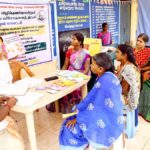An expert committee formed to explore the role of Artificial Intelligence (AI) in the State’s healthcare sector has representation from both health authorities and academic institutions.
The committee will meet periodically to assess the use of AI in healthcare and analyse the scope for development and deployment in healthcare institutions in Tamil Nadu. It will also explore ways to utilise the data as per Tamil Nadu Government’s Data Policy for further development of cost-effective AI technologies in higher education and research institutions.
The Health Secretary will chair the 20-member committee. It includes senior health officials such as Managing Director, Tamil Nadu Medical Services Corporation, Project Director, Tamil Nadu Health Systems Project, Mission Director, National Health Mission – Tamil Nadu, Commissioner of Food Safety and Drug Administration, directors of Medical Education and Research, Medical and Rural Health Services and Public Health and Preventive Medicine, State TB Officer and Project Director, Tamil Nadu State Blindness Control Society.
Other members include a professor of Radiology, Barnard Institute of Radiology, Madras Medical College (MMC), a professor of Respiratory Medicine, MMC, an associate professor of Community Medicine, K.A.P. Viswanatham Government Medical College, Tiruchi and an associate professor (Dermatology, Venereal and Leprosy) of Stanley Medical College. Representatives of REACH, a NGO working in the field of TB, Christian Medical College, Vellore, Indian Institute of Technology, Madras, Anna University and Vellore Institute of Technology, Vellore are part of the committee.
In a recent order, the Health department noted that AI has emerged as a major new field in healthcare, and is helping the medical profession in the early diagnosis of diseases such as cancer.
An expert committee formed to explore the role of Artificial Intelligence (AI) in the State’s healthcare sector has representation from both health authorities and academic institutions.
The committee will meet periodically to assess the use of AI in healthcare and analyse the scope for development and deployment in healthcare institutions in Tamil Nadu. It will also explore ways to utilise the data as per Tamil Nadu Government’s Data Policy for further development of cost-effective AI technologies in higher education and research institutions.
The Health Secretary will chair the 20-member committee. It includes senior health officials such as Managing Director, Tamil Nadu Medical Services Corporation, Project Director, Tamil Nadu Health Systems Project, Mission Director, National Health Mission – Tamil Nadu, Commissioner of Food Safety and Drug Administration, directors of Medical Education and Research, Medical and Rural Health Services and Public Health and Preventive Medicine, State TB Officer and Project Director, Tamil Nadu State Blindness Control Society.
Other members include a professor of Radiology, Barnard Institute of Radiology, Madras Medical College (MMC), a professor of Respiratory Medicine, MMC, an associate professor of Community Medicine, K.A.P. Viswanatham Government Medical College, Tiruchi and an associate professor (Dermatology, Venereal and Leprosy) of Stanley Medical College. Representatives of REACH, a NGO working in the field of TB, Christian Medical College, Vellore, Indian Institute of Technology, Madras, Anna University and Vellore Institute of Technology, Vellore are part of the committee.
In a recent order, the Health department noted that AI has emerged as a major new field in healthcare, and is helping the medical profession in the early diagnosis of diseases such as cancer.
An expert committee formed to explore the role of Artificial Intelligence (AI) in the State’s healthcare sector has representation from both health authorities and academic institutions.
The committee will meet periodically to assess the use of AI in healthcare and analyse the scope for development and deployment in healthcare institutions in Tamil Nadu. It will also explore ways to utilise the data as per Tamil Nadu Government’s Data Policy for further development of cost-effective AI technologies in higher education and research institutions.
The Health Secretary will chair the 20-member committee. It includes senior health officials such as Managing Director, Tamil Nadu Medical Services Corporation, Project Director, Tamil Nadu Health Systems Project, Mission Director, National Health Mission – Tamil Nadu, Commissioner of Food Safety and Drug Administration, directors of Medical Education and Research, Medical and Rural Health Services and Public Health and Preventive Medicine, State TB Officer and Project Director, Tamil Nadu State Blindness Control Society.
Other members include a professor of Radiology, Barnard Institute of Radiology, Madras Medical College (MMC), a professor of Respiratory Medicine, MMC, an associate professor of Community Medicine, K.A.P. Viswanatham Government Medical College, Tiruchi and an associate professor (Dermatology, Venereal and Leprosy) of Stanley Medical College. Representatives of REACH, a NGO working in the field of TB, Christian Medical College, Vellore, Indian Institute of Technology, Madras, Anna University and Vellore Institute of Technology, Vellore are part of the committee.
In a recent order, the Health department noted that AI has emerged as a major new field in healthcare, and is helping the medical profession in the early diagnosis of diseases such as cancer.
‘E-paarvai’
The State has already implemented AI-based initiatives such as ‘e-paarvai’ and digital X-ray analysis for tuberculosis diagnosis.
‘E-paarvai’ is a mobile appliation that leverages AI to detect cataracts during eye screenings. In TB, AI plays a crucial role in active case finding. The AI system rapidly interprets these images and flags those that are highly suggestive of TB, officials said.
Highlighting AI as a “game changer” in many healthcare innovations, the department said that the formation of an expert committee to analyse emerging technology in healthcare in a way suitable for Tamil Nadu is vital.
The expert committee has been tasked with analysing and discussing emerging AI algorithms, and development using higher education institutions and deployment in the State’s healthcare sector.



















